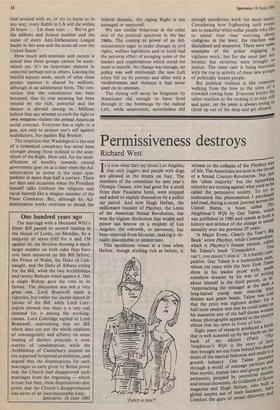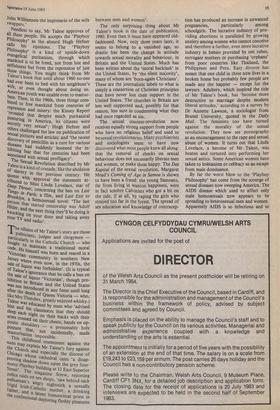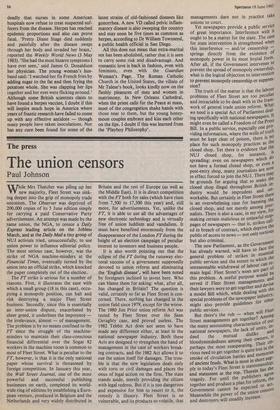Permissiveness destroys
Richard West
Tt is true what they say about Los Angeles; 1 that only joggers and people with dogs are allowed in the streets on foot. The members of the committee for next year's Olympic Games, who had gone for a stroll from their Pasadena hotel, were stopped and asked to explain themselves by a police car patrol. And now Hugh Hefner, the millionaire founder of Playboy, the Lenin of the American Sexual Revolution, has won the highest distinction that wealth and power can bestow on a resident of Los Angeles: the sidewalk, or pavement, has been removed from his street, making it vir- tually inaccessible to pedestrians.
This apotheosis comes at a time when Hefner, though stinking rich as before, is 'Fancy a bite?' witness to the collapse of the Playboy way of life. The Americans are now in the throes of a Sexual Counter-Revolution. Not just `silent silent majority' but the squawking minority are turning against what used to be called the permissive society. To try to understand this phenomenon I purchased and read, during a recent journey across the United States, a book called Thy Neighbour's Wife by Gay Talese, which was published in 1980 and stands as bothh a history and defence of the change in
morality over the previous 25 years. •
A Major Event. Clearly the Year's B18 Boo. k' wrote Playboy, while Cosmopolitan' which is Playboy's female version, called Mr Talese's book 'Compulsive . • • fled
a
can't, you mustn't miss it'. It is hardly com- pulsive. Gay Talese is a humourless man, whose ten years with the New York Times show in his leaden prose style,Ina.cle somehow drearier by his way of writi.n8 about himself in the third person, as 'Approaching the manager at the desk a long-haired young man wearing blue. denims and peace beads, Talese was told that the price was eighteen dollars for a half-hour session and that he could select his masseuse any of the half-dozen women whose photographs appeared in the picture album that lay open in front of him.' Eight years of research produced a booK that is well summed up by the blurb on the back of my edition (Pan): he Neighbour's Wife is the story of how. they brought sex out from behind the clos.ea doors of the marital bedroom and made it a growth industry. Gay Talese journeYds through a world of massage parlours ex- blue movies, topless bars and group sex periments, peopled by centrefold moo; and sexual showmen, Al Goldstein of Scire a magazine and Hugh Hefner, who bul global empire out of male fantasies, Alex Comfort the guru of sexual discovery and
John Williamson the impresario of the wife swappers.'
Needless to say, Mr Talese approves of all these people. He accepts the Playboy Philosophy' as the absurd Hugh Hefner calls his opinions. The 'playboy Philosophy' is a kind of upside-down evangelical puritanism, through which Mankind is to be freed, not from lust and selfishness but from the repression of just those things. You might think from Mr Talese's book that until about 1960 no-one had ever been to bed with his neighbour's wife, or even thought about doing so. American youth was unable even to mastur- bate. Then, in the 1960s, three things com- bined to free mankind from centuries of repression and misery: the Kinsey Report revealed that despite much puritanical Posturing in America, its citizens were secretly very sexual'; Hugh Hefner and others challenged the law on publication of sexual pictures and articles; and 'the recent discovery of penicillin as a cure for various diseases had suddenly lessened the in- hibiting fear that for centuries had been associated with sexual profligacy'. The Sexual Revolution described by Mr Talese is a kind of crusade, like the abolition of slavery in the previous century. He quotes with approval the statement at- tributed to Miss Linda Lovelace, star of TeeP Throat, concerning the ban on Last a. go in Paris, a film, and Last Exit to rooklyn, a homosexual novel: 'The last person that started censorship was Adolf Hitler, and the next thing they'll be doing is
knocking on your door and taking away Your TV and radio'.
The villains of Mr Talese's story are those
Politicians, judges and clergymen particularly in the Catholic Church — who
fought to maintain a traditional moral code. He himself was born and reared in a `Victorian community in southern New Jersey where even now, in the 1970s, the sale of liquor was forbidden'. (It is typical of Talese's ignorance that he calls a ban on the sale of liquor 'Victorian', though pro- hibition in Britain and the United States was not introduced in any form until long after the death of Queen Victoria — who, like Mrs Thatcher, greatly enjoyed whisky.) Talese was educated by nuns who 'advised him and his classmates that they should sleep each night on their backs with their arms crossed on their chests, hands on op- posite shoulders — a presumably holy
posture that, not incidentally, made masturbation impossible.
This childhood resentment against the nuns may explain Mr Talese's fury against the Church and especially the diocese of Chicago whose cathedral casts 'a disap- proving shadow down upon the grey four- st orey Playboy building at 11 East Superior Street'. The magazine Screw, reporting Police raids on sex shops, 'saw behind each Policeman's angry nightstick a sexually frigid Irish-Catholic mother, a drinking father, and a latent homosexual priest in the confessional deploring fleshly pleasures
between men and women'.
The only surprising thing about Mr Talese's book is the date of publication, 1980. Even then it must have appeared old- fashioned. Now, only three years later, it seems to belong to a vanished age, so drastic has been the change in attitude towards sexual morality and behaviour, in Britain and the United States. Much has been written about the 'moral backlash' in the United States, by 'the silent majority', many of whom are 'born-again Christians'. These are the journalistic labels to what is simply a reassertion of Christian principles that have never lost their support in the United States. The churches in Britain are less well supported and, possibly for that reason, less sure in condemning what they had once regarded as sin.
The sexual counter-revolution now receives equally strong support from people who have no religious belief and used to be sexual revolutionaries. Many psychiatrists and sociologists seem to have now discovered what most people knew all along: that the removal of checks on sexual behaviour does not necessarily liberate men and women, or make them happy. The Das Kapital of the sexual revolution, Margaret Mead's Coming of Age in Samoa is shown to have been a fraud: the young Samoans, far from living in wanton happiness, were in fact sombre Calvinists who got a bit on the side, if at all, by raping the girls who strayed too far in the forest. The spread of sex education and knowledge of contracep-
tion has produced an increase in unwanted
pregnancies, particularly among schoolgirls. The lucrative industry of pro- viding abortions is paralleled by growing anxiety among women who cannot conceive and therefore a further, even more lucrative industry in babies provided by test tubes, surrogate mothers or purchasing 'orphans' from poor countries like Thailand, the Philippines and Peru. Easy divorce has meant that one child in three now lives in a broken home but probably few people are made any the happier — except for the lawyers. Adultery, which inspired the title of Mr Talese's book, has 'become more destructive to marriage despite modern liberal attitudes,' according to a survey by Dr Annette Lawson, a sociologist from Brunel University, quoted in the Daily Mail. The feminists too have turned against the morality of the sexual revolution. They now see pornography as an encouragement to the rape and sexual abuse of women. It turns out that Linda Lovelace, a heroine of Mr Talese, was beaten and tortured into performing her sexual antics. Some American women have taken to lesbianism or celibacy as an escape from male dominance.
By far the worst blow to the 'Playboy Philosophy' has come from the scourge of sexual diseases now sweeping America. The AIDS disease which used to affect only male homosexuals now appears to be spreading to heterosexual men and women. Apparently AIDS is so infectious and so deadly that nurses in some American hospitals now refuse to treat suspected suf- ferers from the disease. Herpes has reached epidemic proportions and also can prove fatal. 'Pretty Diane Stage died suddenly and painfully after the disease swept through her body and invaded her brain,' reported the Weekly World News (3 May 1983). 'She had the most bizarre symptoms I have ever seen,' said James 0. Donaldson her physician. The young woman's hus- band said: 'I watched her fix French fries by adding sugar to the fat and then frying the potatoes whole. She was clapping her lips together and her eyes were flicking around.' Although some British scientists claim to have found a herpes vaccine, I doubt if this will inspire much hope in America where years of frantic research have failed to come up with any effective antidote — though many people have taken inoculations. Nor has any cure been found for some of the latest strains of old-fashioned diseases like gonorrhea. A new VD called pelvic inflam- matory disease is also sweeping the country and may soon be five times as common as herpes, according to Dr William Townsend, a public health official in San Diego.
All this does not mean that extra-marital sex has been abolished, rather that it is seen to carry some risk and disadvantage. And romantic love is back in fashion, even with feminists, even with the Guardian Woman's Page. The Roman Catholic Church in the United States, the villain of Mr Talese's book, looks kindly now on the fleshly pleasures of men and women in matrimony. In New Orleans Cathedral, when the priest calls for the Peace at mass, most of the congregation shake hands with those near to them, but the young honey- moon couples embrace and kiss each other on the lips. I doubt if this was learned from the 'Playboy Philosophy'.








































 Previous page
Previous page